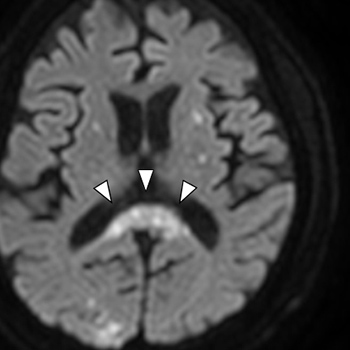Keywords
Bacteraemia, corpus callosum, Infective endocarditis, mild encephalitis/encephalopathy with a reversible splenial lesion, Staphylococcus aureus, MRSA
Abstract
Background: Mild encephalitis/encephalopathy and a reversible splenial lesion (MERS) is a clinicoradiological syndrome with an unknown pathogenic mechanism, which usually involves children. Thus, adult-onset MERS is quite rare.
Case presentation: A 71-year-old man, undergoing haemodialysis due to diabetes-induced chronic kidney disease, manifested a persistent fever and disorientation. Blood culture detected methicillin-resistant Staphylococcus aureus (MRSA), while echocardiography revealed vegetation in the aortic and mitral valves. Magnetic resonance imaging of the head revealed a fluid-attenuated inversion recovery-high, diffusion-weighted image-high lesion in the splenium of the corpus callosum, with a number of emboli. Accordingly, the patient was diagnosed with MERS induced by MRSA endocarditis.
Discussion: Neurological impairment by MERS can be reversible. However, the differential diagnosis of the disease includes ischaemic lesions, multiple sclerosis, malignant lymphoma, acute disseminated encephalomyelitis, and posterior reversible encephalopathy. Clinicians should consider these diseases when MERS is suspected.
References











